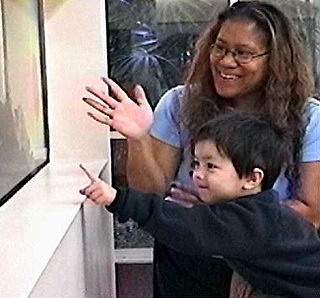Related Research Articles

Dyslexia, previously known as word blindness, is a learning disability that affects either reading or writing. Different people are affected to different degrees. Problems may include difficulties in spelling words, reading quickly, writing words, "sounding out" words in the head, pronouncing words when reading aloud and understanding what one reads. Often these difficulties are first noticed at school. The difficulties are involuntary, and people with this disorder have a normal desire to learn. People with dyslexia have higher rates of attention deficit hyperactivity disorder (ADHD), developmental language disorders, and difficulties with numbers.

Early childhood education (ECE), also known as nursery education, is a branch of education theory that relates to the teaching of children from birth up to the age of eight. Traditionally, this is up to the equivalent of third grade. ECE is described as an important period in child development.
Developmental disorders comprise a group of psychiatric conditions originating in childhood that involve serious impairment in different areas. There are several ways of using this term. The most narrow concept is used in the category "Specific Disorders of Psychological Development" in the ICD-10. These disorders comprise developmental language disorder, learning disorders, motor disorders, and autism spectrum disorders. In broader definitions ADHD is included, and the term used is neurodevelopmental disorders. Yet others include antisocial behavior and schizophrenia that begins in childhood and continues through life. However, these two latter conditions are not as stable as the other developmental disorders, and there is not the same evidence of a shared genetic liability.
The University of Texas Health Science Center at Houston (UTHealth) is a public academic health science center in Houston, Texas, United States. It was created in 1972 by The University of Texas System Board of Regents. It is located in the Texas Medical Center, the largest medical center in the world. It is composed of six schools: McGovern Medical School, The University of Texas MD Anderson Cancer Center UTHealth Graduate School of Biomedical Sciences, UTHealth School of Dentistry, Cizik School of Nursing, UTHealth School of Biomedical Informatics and UTHealth School of Public Health.
The Burlo Garofolo Pediatric Institute is a children's hospital located in Trieste, Italy.
Neurodevelopmental disorders are a group of neurological disorders that affect the development of the nervous system, leading to abnormal brain function which may affect emotion, learning ability, self-control, and memory. The effects of neurodevelopmental disorders tend to last for a person's lifetime.
The Institutes for The Achievement of Human Potential (IAHP), founded in 1955 by Glenn Doman and Carl Delacato, provide literature on and teaches a controversial patterning therapy, which the Institutes promote as improving the "neurologic organization" of "brain injured" and mentally impaired children through a variety of programs, including diet and exercise. The Institutes also provides extensive early-learning programs for "well" children, including programs focused on reading, mathematics, language, and physical fitness. It is headquartered in Philadelphia, Pennsylvania, with offices and programs offered in several other countries. Pattern therapy for patients with neuromuscular disorders was first developed by neurosurgeon Temple Fay in the 1940s. Patterning has been widely criticized and multiple studies have found the therapy ineffective.

Autism therapies include a wide variety of therapies that help people with autism, or their families. Such methods of therapy seek to aid autistic people in dealing with difficulties and increase their functional independence.
Early childhood intervention (ECI) is a support and educational system for very young children who have been victims of, or who are at high risk for child abuse and/or neglect as well as children who have developmental delays or disabilities. Some states and regions have chosen to focus these services on children with developmental disabilities or delays, but Early Childhood Intervention is not limited to children with these disabilities.
Adolescent medicine also known as adolescent and young adult medicine is a medical subspecialty that focuses on care of patients who are in the adolescent period of development. This period begins at puberty and lasts until growth has stopped, at which time adulthood begins. Typically, patients in this age range will be in the last years of middle school up until college graduation. In developed nations, the psychosocial period of adolescence is extended both by an earlier start, as the onset of puberty begins earlier, and a later end, as patients require more years of education or training before they reach economic independence from their parents.

Developmental coordination disorder (DCD), also known as developmental motor coordination disorder, developmental dyspraxia or simply dyspraxia, is a neurodevelopmental disorder characterized by impaired coordination of physical movements as a result of brain messages not being accurately transmitted to the body. Deficits in fine or gross motor skills movements interfere with activities of daily living. It is often described as disorder in skill acquisition, where the learning and execution of coordinated motor skills is substantially below that expected given the individual's chronological age. Difficulties may present as clumsiness, slowness and inaccuracy of performance of motor skills. It is also often accompanied by difficulty with organisation and/or problems with attention, working memory and time management.

The University of Florida College of Education is the teacher's college, or normal school, of the University of Florida. The College of Education is located on the eastern portion of the university's Gainesville, Florida, campus in Norman Hall, and offers specializations in special education, higher education, educational policy, elementary education, counseling, teaching, and other educational programs. It is consistently ranked one of the top schools of education in the nation. The college was officially founded in 1906. In fiscal year 2020, the College of Education generated $102.8 million in research funding.

The Kennedy Krieger Institute is a nonprofit, 501(c)(3) tax-exempt, Johns Hopkins affiliate located in Baltimore, Maryland, that provides in-patient and out-patient medical care, community services, and school-based programs for children and adolescents with learning disabilities, as well as disorders of the brain, spinal cord, and musculoskeletal system. The Institute provides services for children with developmental concerns mild to severe and is involved in research of various disorders, including new interventions and earlier diagnosis.
Global developmental delay is an umbrella term used when children are significantly delayed in their cognitive and physical development. It can be diagnosed when a child is delayed in one or more milestones, categorised into motor skills, speech, cognitive skills, and social and emotional development. There is usually a specific condition which causes this delay, such as Fragile X syndrome or other chromosomal abnormalities. However, it is sometimes difficult to identify this underlying condition.

Samuel J. Meisels is an American academic in the areas of early childhood assessment, child development and educational practices that support the developmental needs of young children.
The Mischer Neuroscience Institute is a combined research and education effort between the Vivian L. Smith Department of Neurosurgery and the Department of Neurology at McGovern Medical School at UTHealth Houston and Memorial Hermann Hospital. Located in Houston, the Institute draws patients from around the world for specialized treatment of diseases of the brain and spine. It was the first center in Texas and one of only a few institutions in the country to fully integrate neurology, neurosurgery, neuroradiology, neuro-oncology, spine surgery, pain medicine and neurorehabilitation.
Developmental regression is when a child who has reached a certain developmental stage begins to lose previously acquired milestones. It differs from developmental delay in that a child experiencing developmental delay is either not reaching developmental milestones or not progressing to new developmental milestones, while a child experiencing developmental regression will lose milestones and skills after acquiring them. Developmental regression is associated with diagnoses of autism spectrum disorder, childhood disintegrative disorder, Rett syndrome, Landau-Kleffner syndrome, and neuro-degenerative diseases. The loss of motor, language, and social skills can be treated with occupational therapy, physical therapy, and speech therapy.
Maria Luisa Escolar is a pediatrician, clinical professor, and researcher who specializes in pediatric neurodevelopmental disabilities. She is Founder and Director of the Program for the Study of Neurodevelopment in Rare Disorders at Children's Hospital of Pittsburgh of the University of Pittsburgh Medical Center. Escolar is nationally and internationally known for her research and clinical care of children with leukodystrophies, lysosomal storage diseases, and other inherited metabolic diseases.
Adam Winsler is a developmental psychologist known for his research on early child development, private speech, and benefits of arts education. Winsler is Professor of Applied Developmental Psychology at George Mason University.
Reid Lyon is a neuroscientist (neuropsychology), specialist in learning disorders, and researcher on the science of reading.
References
- ↑ "About CLI". Children's Learning Institute. Online.
- ↑ "Our Clinics". Children's Learning Institute. Online.
- ↑ "Dan L Duncan Children's Neurodevelopmental Clinic". Children's Learning Institute.
- ↑ "Our Programs". Children's Learning Institute. Online.